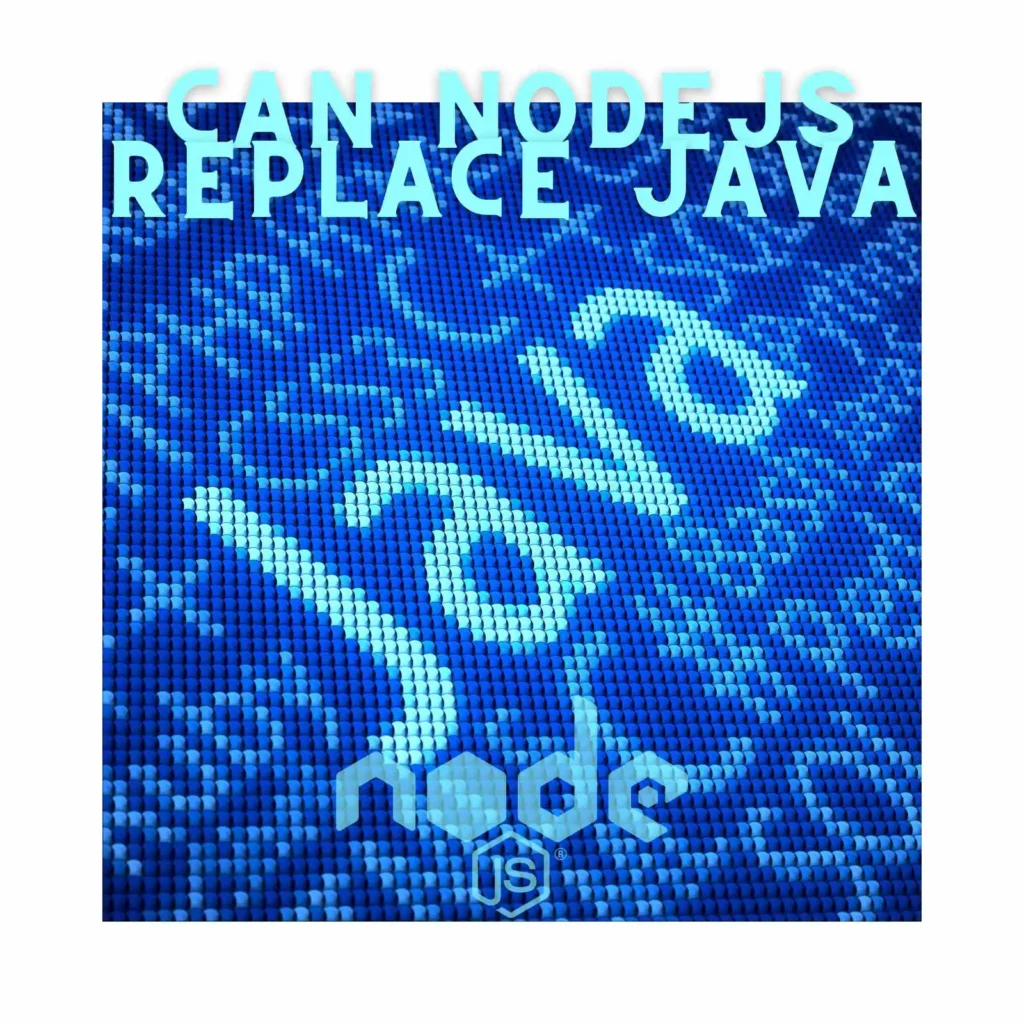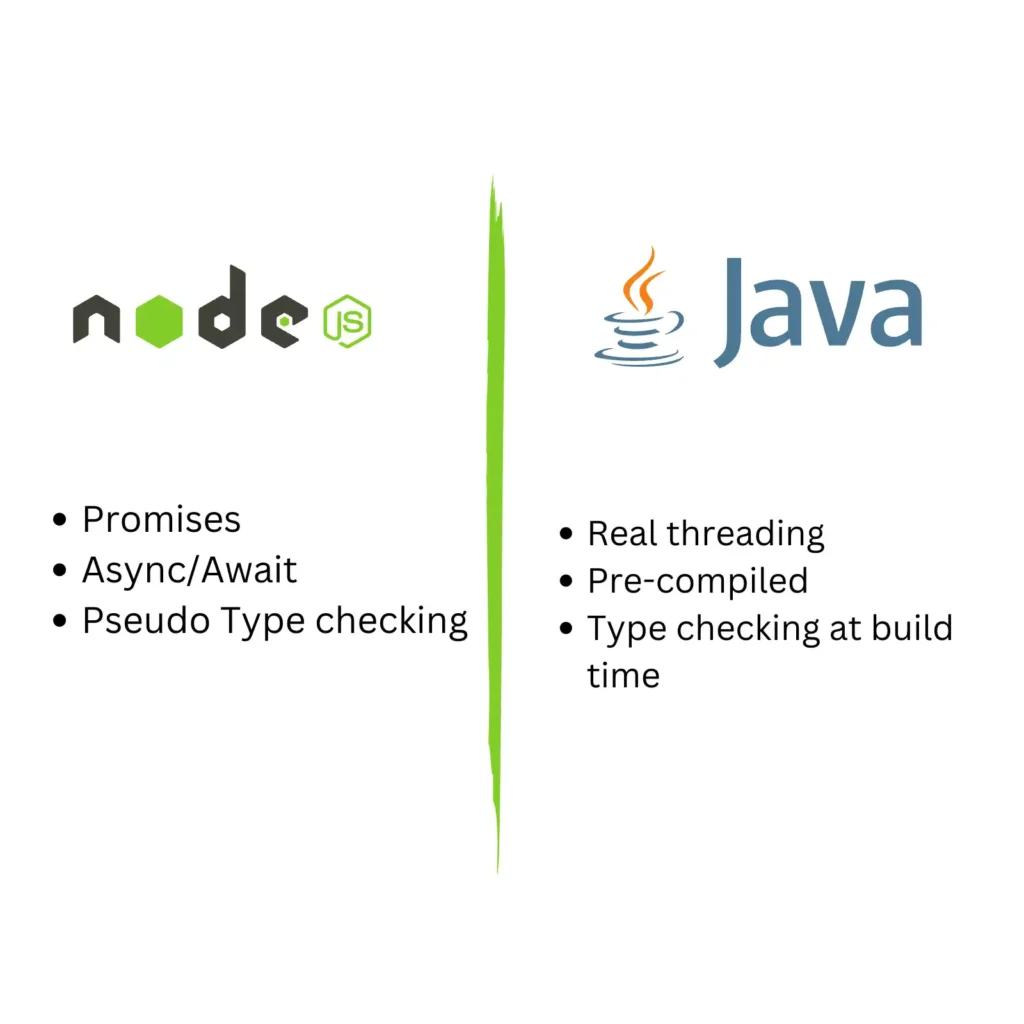
One question that always lingers when I’ve been teaching my classes lately is whether NodeJS can replace Java. I know NodeJS has gained a lot of popularity over the years and this is somewhat justified. In this article I’m going to try to shed some light on the topic in an extensive way to see where this has happened and why. The truth is that NodeJS and Java both fill in different gaps of requirements on your day to day use but there’s cases where they can be used interchangeably.
If you are here looking for the short answer then that is no. NodeJS cannot fully replace Java for many reasons but primarily because it is designed to work in a different way and help with different types of programmatic problems. So now that we got the easy monolectic answer out of the way lets take a deeper dive as to why I do not think NodeJS will replace Java in the near or even distant future.
The way I’m going to approach this is basically in two segments, first I’m going to tell you what similarities the two languages have and in which cases NodeJS can actually replace Java and then I will address all the cases where I do not think Java can replace NodeJS.
Cases Where NodeJS Can Replace Java
So let’s start with covering some cases where I think NodeJS can replace Java. Again this is my point of view and I may be biased but I believe these areas making both languages very close to each other when it comes to implementation.
For those that do not want to read through this I created a visual representation of it:

- Building web based online applications: Node.js is a great Javascript framework for building online web apps. Some cases which I’m sure you have seen out there are: chat apps and online games which are handled well by NodeJS due to its non-blocking, event-driven model. This allows it to handle multiple concurrent connections efficiently, making it a good choice for building online applications that can handle web traffic efficiently. In the past Java used to be the dominant in this area but the v8 engine has vastly improved since then making it possible to replace Java for these kind of I/O tasks.
- Another great area is building any type of microservice. Node.js is often used to build microservices due to its lightweight, fast nature and ability to easily scale. It can be a good choice for building a distributed system where each microservice is responsible for a specific task. This kind of architecture has surfaced lately with the rise of cloud technologies more specifically AWS Lambdas which make NodeJS very well suited for this kind of task. On the other hand I think Java has actually lagged in this department and it has been more-over replaced by NodeJS here.
- Any backend/server-side applications. Node.js can be used to build stuff such as web servers and APIs. This basically builds upon the previous point which is micro-service driven architecture models. If you pair it with technologies that run on the cloud such as API Gateway then the entry point to get some NodeJS up and running is much lower than that of Java. Furthermore it’s more lightweight in terms of dependencies and does not need a compiler to run so deploying it is a breeze. Again I think NodeJS has pretty much replaced Java for these kind of tasks and it has become the goto Language framework, only being rivaled by Python.
Since I’ve used both Java and NodeJS for all of the above scenarios I can tell you with certainty that the area is still very competitive between the two. In my opinion I think we will see NodeJS staying on top of the above three use cases and I doubt this will change unless the Java developers start making some really core changes to the programming language virtual machine (JVM).
Cases Where NodeJS Cannot Replace Java
You will ask me in the intro you said that NodeJS cannot replace Java yet but you just gave us a big list of reasons of where NodeJS has become the goto solution. Yes, this is true but again there’s some areas which I think NodeJS cannot compete with Java and these are the reasons which I do not think it will replace it. Lets start covering some in detail so I can give you my point of view on this and better explain myself on why I made this assertive statement earlier.
Like before I have created a visual representation of what features I think are important to consider that Java is ahead of NodeJS and can’t be replaced easily.

- Implementing enterprise applications. Java is great for building enterprise applications due to its robust ecosystem and strong support for multithreading. It is often used for building mission-critical systems that require a high level of stability and scalability. Basically as you know NodeJS does not support real threading/concurrency making it difficult when it runs in an enterprise environment and these things are needed. This huge limitation in my opinion gives it a handicap in terms of speed and ability to compete with Java.
- Limited or strict memory and CPU allocation. Java has a well-optimized garbage collection system, which makes it a good choice for applications that have strict memory and CPU usage constraints. As you know since Java is pre-compiled it has a huge edge here when doing memory management as it knows the types and can better handle garbage collection via its interpreter. On the other hand NodeJS is memory hungry since every time you want to run a concurrent task you are limited into spawning a new process and having to do inter process communication work and synchronization. This increases the complexity of your code by a long margin and it also slows down development cycles.
- Enforcing strict type checking static typing. Java has strong static typing, which can be beneficial in certain situations, such as when working with large codebases or when you need to ensure that data is being handled correctly. NodeJS is catching up here (I will talk about this later on) with the introduction of Typescript. The summary is that Java has a more mature way of doing this and it can also catch a lot of exceptions at build time rather than runtime. This major difference in my opinion makes Java optimal for a professional environment where you need to be very pedantic about potential errors that may rise.
- Compatibility is another one reason. Basically Java has dominated the corporate environment for a longer period of time than NodeJS. Even though both Javascript and Java came out at about the same time, NodeJS was introduced much later making it a newer project. This means there’s a lot more systems out there that were developed in Java and they are likely to sit until NodeJS improves. Even if it improves it would require a lot of time and resources to port the code over which for a company this can be a very costly operation.
As you can tell my reasoning above is pretty strong of why I think Java is here to stay and I do not think NodeJS will replace it any time soon. We will have to see drastic changes in the future for this to happen. Talking of which I’m going to talk about some potential changes that are upcoming in NodeJS which may cause a further shift from Java to NodeJS so stay tuned for the next section.
What May Change In The Future That Can Change Things

Although there have not been any major changes to Node.js that have made it significantly closer to Java in the past few years there’s still some that if improved may play a role in a shift of direction into the NodeJS territory. Again I think this is still a far fetched thing but lets cover some below which definitely had an impact in some use-cases.
- The addition of TypeScript basically made Node.js more of a choice. Since it’s a superset of JavaScript that adds optional static typing it was an easy transition for a lot of developers. This can make it easier to work with large codebases and helps to catch certain types of errors at compile time which actually solves one of the biggest problems that it previously had to enter a more professional enterprise environment.
- The new Async/await system. Node.js supports the async/await syntax, which allows you to write asynchronous code in a way that looks similar to synchronous code. This can make it easier to write code that runs asynchronously, which is often necessary in Node.js due to its non-blocking, event based arch. I know which may come as a surprise to some of you but being able to do more things asynchronously is what driven a lot to use NodeJS as a functional language. I know I know this is a multi-paradigm language but still it is good if your architecture supports functional workflows giving it an edge here over Java.
- The child of async/await in my opinion is promises: Now that Node.js also supports promises allowing you to use pattern for writing asynchronous code that can help to make it more readable and easier to understand. Furthermore it improves your functional programming along with a micro-architecture approach to your code. Pairing it as we said earlier with the rise of cloud technologies this makes it a recipe for success when compared to Java.
- A potential improvement in the V8 engine into allowing pseudo threads via a fork based abstraction. I know this may sound crazy to some of you since it has the overhead of using more memory (due to the overhead of a new process) but it may actually drive a lot of people into using it that previously needed a proper concurrency library. Since concurrency was one of the biggest reasons why a person may choose Java over NodeJS this could prove to be a solution without drastically changing how NodeJS V8 engine works. Since I do not think we will see anytime soon a multi-threading approach based on the limitations of how V8 was originally implemented it may prove a great work-around for the concurrency fans.
Just remember that both Java and NodeJS are still a fundamentally different languages with a different set of features and capabilities. It is important to carefully consider the specific requirements of your project and choose the language and technology that best fits your needs. I like both and based on the project needs I make my choice. Hopefully I helped you understand here why NodeJS will not be replacing Java anytime soon.